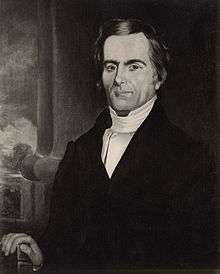Andrew Wylie (college president)
| Andrew Wylie | |
|---|---|
 | |
| President of Indiana University | |
|
In office 1829–1851 | |
| Succeeded by | Alfred Ryors |
| President of Jefferson College | |
|
In office 1811–1816 | |
| Preceded by | James Dunlap |
| Succeeded by | William McMillan |
| President of Washington College | |
|
In office 1817–1828 | |
| Preceded by | Matthew Brown |
| Succeeded by | David Elliott |
| Personal details | |
| Born |
April 12, 1789 Washington County, Pennsylvania |
| Died |
November 11, 1851 (aged 62) unknown |
| Alma mater | Jefferson College |
| Religion | Presbyterian |
Andrew Wylie (April 12, 1789 – November 11, 1851) was an American academic and theologian, who was president of Jefferson College (1811–1816) and Washington College (1816–1828) before becoming the first president of Indiana University (1829–1851).[1]
Early life and education
The son of Adam Wylie, an immigrant from County Antrim, Ireland and farmer in Fayette County, Pennsylvania, Andrew was educated at home and in local schools in Washington County, Pennsylvania. In 1804, at age fifteen, Wylie entered Jefferson College, in Canonsburg, Pennsylvania. He graduated with honors in 1810 and was immediately appointed a tutor at the college.
President of Jefferson and Washington Colleges
The next year, in 1811, Wylie was elected unanimously to serve as president of Jefferson College. He was licensed to preach in 1812, and in 1813 was ordained as a Presbyterian minister. In 1813 he married Margaret Ritchie, daughter of a wealthy Canonsburg merchant.
Wylie was elected a member of the American Antiquarian Society in 1815.[2]
While president of Jefferson College, Wylie led a controversial effort to merge with nearby Washington College. When that effort failed, in 1816 Wylie moved on to become president of Washington College and pastor of the Presbyterian church. In 1825 Wylie was given an honorary Doctorate of Divinity from Union College, in Schenectady, New York. Wylie resigned his presidency in 1828, over a theological dispute among local Presbyterian groups in Washington, Pennsylvania.
He was close friends with William Holmes McGuffey, who lived in Wylie's house for a time; they often would walk the 3 miles to Washington College together.[3]
He was one of the original members of the Presbytery of Washington (in Pennsylvania), which was founded on October 19, 1819.[4]
President of Indiana University
In 1828, the trustees of the newly formed Indiana College wrote to Wylie offering him the position of president. Wylie accepted and began in the fall of 1829. There he joined two other faculty members, Baynard Rush Hall who taught Ancient Greek and Latin, and John Hopkins Harney who taught mathematics, natural philosophy, mechanical philosophy and chemistry. In addition to serving as President, Wylie taught classes in moral philosophy, mental philosophy, rhetoric, evidences of Christianity, belles lettres, and the Constitution of the United States. When he arrived at Indiana College the total enrollment was 40 students. Additionally, he found local schools lacking and established a preparatory department in the College. Several students from Washington College followed Wylie to complete their degrees at Indiana College.
In 1837 he recruited his half-cousin Theophilus Adam Wylie to Indiana College to teach mathematics, natural philosophy and chemistry.
He guided the school through an important time of transition as the state legislature rechartered the college as Indiana University in 1838.
In 1842, Wylie established the law department at Indiana University, which became the School of Law in 1889.
In Bloomington, Wylie continued to have conflicts with Presbyterians over Calvinist theology. In 1841, he left the Presbyterian Church to become a deacon in the Protestant Episcopal Church, and became an ordained priest in 1842.
Wylie died in office in 1851, after complications from a wood-chopping accident.
During his time as president at Indiana University, student enrollment increased from 40 to 74 enrolled in the college, 58 in the preparatory department, and 28 in the law department.
Wylie’s Bloomington, Indiana home, is preserved as the Wylie House Museum by Indiana University and is administered by the IU Libraries.
Works
- Wylie, D.D., Andrew (June 1833). Rev. S.C. Jennings, ed. "Sermon XIV: The Nature of Faith". The Presbyterian Preacher. Pittsburgh: D. and M. MacLean. II (1): 193–208.
References
- Wylie, Theophilus Adam (1890). "Dr. Andrew Wylie, First President of Indiana University". Indiana University: Its History from 1820, when Founded, to 1890. Wm. B. Burford. pp. 91–94.
- Sprague, William Buell (1890). "Andrew Wylie, D.D.". Annals of the American Pulpit : Episcopalian. v.5. R. Carter: Wm. B. Burford. pp. 770–789.
External links
- "Andrew Wylie". Find a Grave. Retrieved August 9, 2010.
- Indiana University President's Office records, 1820-1851
- Andrew Wylie papers, 1808-1858, at the Indiana University Archives.
- ↑ "Andrew Wylie (1812-1816)". U. Grant Miller Library Digital Archives. Washington & Jefferson College. 2003-09-04.
- ↑ American Antiquarian Society Members Directory
- ↑ Coleman, Helen Turnbull Waite (1956). Banners in the Wilderness: The Early Years of Washington and Jefferson College. University of Pittsburgh Press. pp. 111–120. OCLC 2191890.
- ↑ Presbyterian Church in the U.S.A, ed. (1889). "History of Organization and Proceedings of Presbytery 1819-1888". History of the Presbytery of Washington. J.B. Rodgers. p. 41.
| Academic offices | ||
|---|---|---|
| Preceded by James Dunlap |
President of Jefferson College 1812 – 1816 |
Succeeded by William McMillan |
| Preceded by Matthew Brown |
President of Washington College 1817 – 1828 |
Succeeded by David Elliott |
| Preceded by no predecessor |
President of Indiana University 1829 – 1851 |
Succeeded by Alfred Ryors |